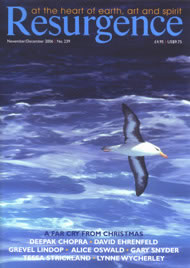CHRISTMAS FUELS consumerism. Production lines and shopping centres are waiting for Christmas to arrive. They are seeking greater sales and greater profits this Christmas than last. Christmas fuels consumerism and consumerism fuels global warming. Global warming fuels fear, guilt, doom and gloom. All these acts and feelings are a far cry from Christmas.
Whatever we consume – food, clothes, housing, agriculture, transportation, technology and holidays – is dependent on the continuous use of fossil fuels. Higher living standards, higher economic growth and higher consumption levels have been and still continue to be the unchallenged aspiration of all nations, all governments and all industrial societies.
But the challenge of global warming is slowly bringing about a certain shift in the consciousness of politicians, policy-makers and captains of industry. More and more people are realising that we cannot go on as before: that business as usual is no longer an option. It is clear that while the ice caps of Antarctica are melting and other intricate patterns of nature are being destroyed current energy systems are not sustainable. Even the mainstream media and conservative think tanks are beginning to talk about economy as a subsidiary of ecology.
However, this shift in consciousness is only skin-deep. It is limited to finding alternatives to carbon emissions (which are merely a symptom of the problem rather than the root cause). To treat the symptom policy-makers are looking at bio-fuels instead of fossil fuels. They are looking at technological solutions to find new sources of energy such as solar power, wind power and nuclear power. Their deep desire is to go on consuming as much as we have been, perhaps even more at Christmas time and at all times, but preferably through so-called sustainable sources. David Ehrenfeld in his article is exploding this myth. Ehrenfeld, a US professor of ecology, calls this technological fix “death by friendly fire”. In his view global warming is not an unfortunate occurrence but the inevitable outcome of consumerist culture.
The climate crisis is actually a crisis of consumerism. Whether we need more clothes, more computers or more cosmetics has become an irrelevant question. We have to have them. We have to consume in order to keep the wheels of the economy turning. We have to keep buying to keep people in employment, no matter what the consequences. More than three-quarters of the world’s forests have already been cleared to feed our consumerism, and still there is no halt. Every year an area the size of Austria is cleared of virgin forests from the Amazon to Indonesia so that we can keep consuming. We go to war to secure oil supplies and other natural resources, so that we can keep consuming. And now we merely wish to find some new miracle technology to avoid the consequences of our consumerism. But there is no such thing as consequence-free consumerism. Whether we cut down forests with the use of fossil fuel or bio-fuel is neither here nor there. It has been said that “trees precede civilisation, deserts follow”. Western civilisation is synonymous with consumerism. We cannot escape from the effects of our consumerist culture.
By all means let us replace fossil fuel with bio-fuel where appropriate, but we have to do more than that – we have to replace our quantitative consumerism with a qualitative lifestyle. We need to move away from more and global to less and local; from accumulation of unnecessary clutter to enjoyment of the good things in life like art, music, friendship and free time. We need to shift from waste to frugality, from consuming to making, from illusion to imagination, from desire to delight and from consumption of natural resources to an appreciation of the natural world. If we do that then Christmas will again be an occasion of great celebration rather than an excuse for more consumption. And then again the secular and the sacred, the material and the spiritual will be recognised as being two sides of the same coin.
But who is going to speak the truth to power? Governments, business leaders and policy-makers have a vested interest in maintaining the addiction to consumerism. It has to be poets, artists, musicians and writers who can point out that our civilisational emperor has no clothes. This is what Gary Snyder and Tessa Strickland are elucidating in their essays. Once again poets are being called upon to become the true “legislators” of the world, as Shelley imagined. Scientists can point out the facts, but only poets can create a new culture.
SATISH KUMAR








